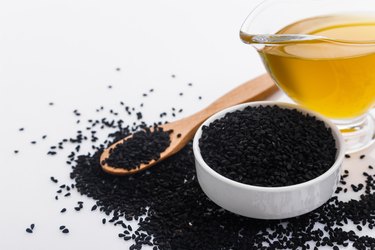
Black seed oil, extracted from the seeds of a plant from Egypt called Nigella sativa, has attracted attention as a possible treatment for people with diabetes or those at risk for the disease. Experts caution, though, that more scientific research is needed to back up hopes for its health benefit.
Read more: Side Effects of Black Seed
Video of the Day
Video of the Day
The Link to Blood Sugar
Diabetes occurs when your body cannot make or properly use the hormone insulin, which is charged with moving blood sugar to your cells for energy. When blood sugar builds up over time, your risk for vision problems, kidney damage, heart disease and other diabetes-related complications increases, explains the National Institute of Diabetes and Digestive and Kidney Diseases.
Nigella sativa can improve blood sugar control, and it also serves as an antioxidant, says Maria E. Pena, MD, an assistant professor at the Icahn School of Medicine and director of endocrine services at Mount Sinai Doctors, Forest Hills, in New York. Antioxidants help stop damaging free radicals that have been linked to cancer and other diseases, the Academy of Nutrition and Dietetics explains.
However, Dr. Pena is quick to caution that while the initial studies on black seed oil (also called black cumin oil or kalonji oil) look promising, more studies are needed before it can be widely recommended as a treatment for diabetes.
"More clinical trials are necessary to clarify beneficial effects of N. sativa, its effective type and dosage for diabetes management and its complications," she says. "This shouldn't replace current medications."
Benefits of Black Seed
Exactly what makes black seed oil healthful is not fully understood, but researchers suggest that thymoquinone may be responsible for the benefits. Found in abundance in the seeds of Nigella sativa, thymoquinone is a powerful plant-based compound that confers antioxidant and anti-inflammatory effects, according to an analysis of existing medical literature on black seed and health, published in the Journal of Pharmacopuncture in September 2017.
The researchers also found that studies have shown that black seed oil may lower blood sugar and blood pressure and improve blood cholesterol. Such changes can lower your risk for heart disease and diabetes, according to the American Heart Association.
One study included in the analysis involved 60 people with metabolic syndrome. People who consumed 5 milliliters of black seed oil a day while taking their regularly prescribed blood-pressure-lowering medication and the drug metformin to control blood sugar showed better improvements in fasting blood sugar levels, low-density lipoprotein cholesterol and total cholesterol after six weeks than those who did not take black seed oil. Black seed oil had no effect on body mass index or waist circumference.
Metabolic syndrome is defined as a group of three or more conditions that, when taken together, up a person's risk for heart disease, diabetes and stroke, the American Heart Association says. These conditions include high blood pressure, abdominal obesity or waist circumference, high cholesterol, elevated triglycerides and high blood sugar. The American Heart Association points out that 23 percent of adults have metabolic syndrome.
The Journal of Pharmacopuncture research found black seed oil seems to be safe, though possible side effects may include nausea, bloating or a burning sensation. It also noted a "slight increase" in liver and kidney enzymes that occurred when people consumed black seed oil and crushed seeds.
Because even so-called "natural" supplements can cause side effects and may interfere with medications, it's important to talk with your doctor before adding a supplement to your daily regimen.
Read more: The Best Multivitamins for Diabetics
- National Institute of Diabetes and Digestive and Kidney Diseases: “What Is Diabetes?”
- Maria E. Pena, MD, assistant professor, Icahn School of Medicine, and director, endocrine services, Mount Sinai Doctors, Forest Hills, New York
- Academy of Nutrition and Dietetics: “Antioxidants – Protecting Healthy Cells”
- Journal of Pharmacopuncture: “Review on Clinical Trials of Black Seed (Nigella sativa) and Its Active Constituent, Thymoquinone”
- American Heart Association: “Metabolic Syndrome”
- American Heart Association: “Lifestyle Changes for Heart Attack Prevention”
Was this article helpful?
150 Characters Max
0/150
Thank you for sharing!
Thank you for your feedback!
Is this an emergency? If you are experiencing serious medical symptoms, please see the National Library of Medicine’s list of signs you need emergency medical attention or call 911.